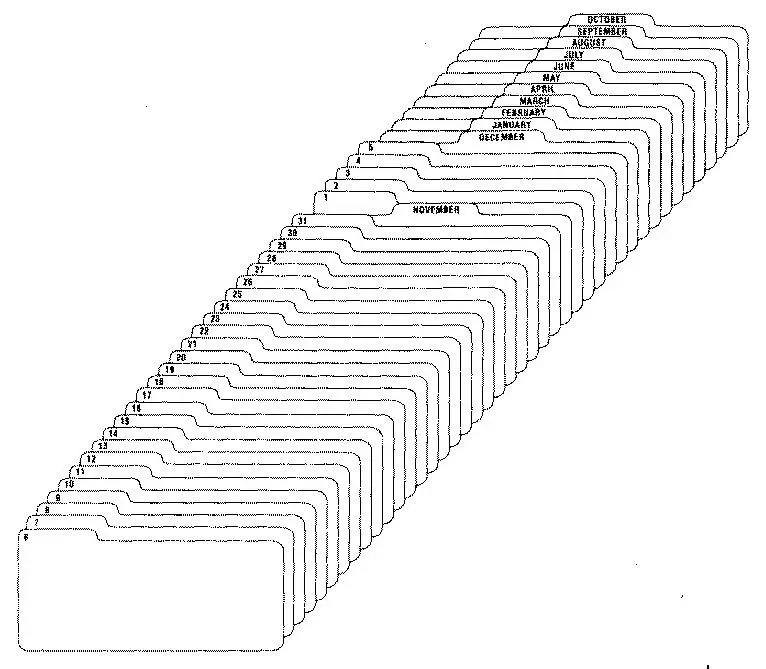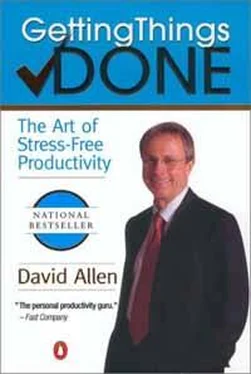The big advantage of using file folders for your tickler system is that they allow you to store actual documents (the form that needs to be filled out on a certain day, the memo that needs to be reviewed then, the telephone note that needs action on a specific date, etc.).
In order for the system to work, you must update it every day. If you forget to empty the daily file, you won't trust the system to handle important data, and you'll have to manage those things some other way. If you leave town (or don't access the file on the weekend), you must be sure to check the folders for the days you'll be away, before you go.

FILE-FOLDER-STYLE SAMPLE SETUP (OCTOBER 5)
Checklists: Creative Reminders
The last topic in personal system organization that deserves some attention is the care and feeding of checklists, those recipes of potential ingredients for projects, events, and areas of value, interest, and responsibility.
The most creative checklists are often generated at the back end of a good consulting process with a team or company. Good ones also show up as areas of focus for training staff or hiring into job slots.
When I'm clearing in-baskets with clients and reviewing other things they're concerned about, we often run across little "Memos to Self" like:
• Exercise more regularly.
• Make sure we have evaluation forms for each training.
• Spend more quality time with my kids.
• Do more proactive planning for the division.
• Maintain good morale with my team.
• Ensure we are in alignment with corporate strategy.
• Keep the client billing process up to date.
What should you do with these "fuzzier" kinds of internal commitments and areas of attention?
First, Clarify Inherent Projects and Actions
For much of this kind of "stuff," there is still a project and/or an action that needs to be defined. "Exercise more regularly" really translates for many people into "Set up regular exercise program" (project) and "Call Sally for suggestions about personal trainers" (real action step). In such cases, inherent projects and actions still need to be clarified and organized into a personal system.
But there are some things that don't quite fit into that category.
Blueprinting Key Areas of Work and Responsibility
Objectives like "Maintain good physical conditioning" or "Physical health and vitality" may still need to be built into some sort of overview checklist that will be reviewed regularly. You have multiple layers of outcomes and standards playing on your psyche and your choices at any point in time, and knowing what those are, at all the different levels, is always a good idea.
I suggested earlier that there are at least six levels of your "work" that could be defined, and that each level deserves its own acknowledgment and evaluation. A complete inventory of every-thing you hold important and are committed to on each of those levels would represent an awesome checklist. It might include:
• Career goals
• Service
• Family
• Relationships
• Community
• Health and energy
• Financial resources
• Creative expression
And then moving down a level, within your job, you might want some reminders of your key areas of responsibility, your staff, your values, and so on. A list of these might contain points like:
• Team morale
• Processes
• Timelines
• Staff issues
• Workload
• Communication
All of these items could in turn be included on the lists in your personal system, as reminders to you, as needed, to keep the ship on course, on an even keel.
The More Novel the Situation, the More Control Is Required
The degree to which any of us needs to maintain checklists and external controls is directly related to our unfamiliarity with the area of responsibility. If you've been doing what you're doing for a long time, and there's no pressure on you to change in that area, you probably need minimal external personal organization to stay on cruise control. You know when things must happen, and how to make them happen, and your system is fine, status quo. Often, though, that's not the case.
Many times you'll want some sort of checklist to help you maintain a focus until you're more familiar with what you're doing. If your CEO suddenly disappeared, for example, and you had instantly to fill his shoes, you'd need some overviews and outlines in front of you for a while to ensure that you had all the mission-critical aspects of the job handled. And if you've just been hired into a new position, with new responsibilities that are relatively unfamiliar to you, you'll want a framework of control and, structure, if only for the first few months.
There have been times when I needed to make a list of areas that I had to handle, temporarily, until things were under control. For instance, when my wife and I decided to create a brand-new structure for a business we'd been involved with for many years, I took on areas of responsibility I'd never had to deal with before— namely, accounting, computers, marketing, legal, and administration. For several months I needed to keep a checklist of those responsibilities in front of me to ensure that I filled in the blanks everywhere and managed the transition as well as I could. After the business got onto "cruise control" to some degree, I no longer needed that list.
Checklists can be highly useful to let you know what you don't need to be concerned about.
Checklists at All Levels
Be open to creating any kind of checklist as the urge strikes you. The possibilities are endless—from "Core Life Values" to "Things to Take Camping." Making lists, ad hoc, as they occur to you, is one of the most powerful yet subtlest and simplest procedures that you can install in your life.
To spark your creative thinking, here's a list of some of the topics of checklists I've seen and used over the years:
• Personal Affirmations (i.e., personal value statements)
• Job Areas of Responsibility (key responsibility areas)
• Travel Checklist (everything to take on or do before a trip)
• Weekly Review (everything to review and/or update on a weekly basis)
• Training Program Components (all the things to handle when putting on an event, front to back)
• Clients
• Conference Checklist (everything to handle when putting on a conference)
• Focus Areas (key life roles and responsibilities)
• Key People in My Life/Work (relationships to assess regularly for completion and opportunity development)
• Organization Chart (key people and areas of output to manage and maintain)
• Personal Development (things to evaluate regularly to ensure personal balance and progress)
Get comfortable with checklists, both ad hoc and more permanent. Be ready to create and eliminate them as required. Appropriately used, they can be a tremendous asset in personal productivity.
If in fact you have now collected everything that represents an open loop in your life and work, processed each one of those items in terms of what it means to you and what actions are required, and organized the results into a complete system that holds a current and complete overview—large and small—of all your present and "someday" projects, then you're ready for the next phase of implementation in the art of stress-free productivity—the review process.
8. Reviewing:KeepingYour System Functional
Читать дальше












